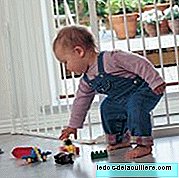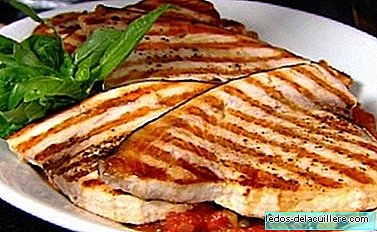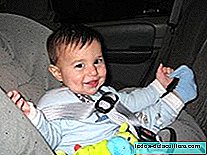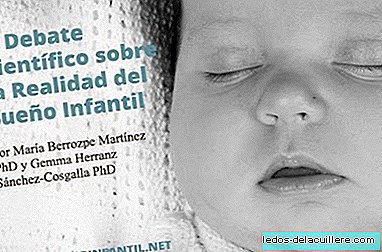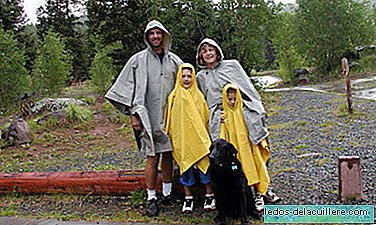
They say that the cold has come, and in reality the temperatures have dropped somewhat, perhaps not as much as would be desirable (at least in the Valencian Community), the point is that children are more vulnerable to this change, and as a consequence, many will begin to contract the diseases associated with winter.
The cold is not to blame for our kids getting sick, although in the months that will pass until the arrival of spring, there is a tendency for children to be affected by diseases with pathologies related to the respiratory system
We had already explained the measures to prevent colds, flu, bronchitis or pharyngitis, but now we want to bring the advice of FAROS, so that we are all prepared. In the first place, we are going to review which of the causes that cause these diseases, because if the cold is not to blame, what motivates all those absences from school, visits to the pediatrician, and the last mornings in bed ?.
General factors:
Some viruses (for example, the flu virus), protect themselves from the cold by covering themselves with a resistant layer, so they can infect several people.
When it rains, air pollutants circulate better and viruses circulate more easily (This is very curious because we all think that the rain purifies, something that in important quantities I suppose will happen, anyway it is so necessary in general ...).
The natural barriers of defense of the nose (are cilia and mucous membranes), lose effectiveness with the cold, thus the microorganisms do not have so many difficulties in entering the organism. It also happens that these natural barriers do not have the same capacity to heat the air as when it is hot.
Ventilation is sometimes lacking in homes (and this favors household contamination), and closed spaces that facilitate contact with other children (schools, shopping centers), viruses are easily transmitted.
Factors related to children:
It is not uncommon for them not to coat properly, and this is risky when temperature changes occur.
The children children under 7 are more vulnerable to weather changes and they are more at risk of getting infections, because they usually have a more buccal than nasal breathing.
Many of the common respiratory diseases that children suffer during the cold months are caused by a wide variety of viruses, and they are spread by infection, which is caused by a lowering of defenses rather than by weather conditions

You can reduce exposure to viruses
Hygiene is very important: it implies avoid contact of children with sick peoplewash your hands frequently; as well as not sharing utensils such as glasses, plates, cutlery, towels and pacifiers with other children.
The vaccine ?, only after six months and if the pediatrician recommends it, or the child is part of the risk groups.
One measure to apply is to avoid crowds, and ventilate domestic rooms well. Indoors, it is preferable to use electric or gas stoves, and keep it warm (not hot), otherwise the body does not develop its own cold adaptation regulatory mechanisms.
Temperature changes should also be avoided when we leave home
- Speaking of shelter: doing it in an exaggerated way is not convenient, since in this way children cannot regulate their body temperature with that of the environment, nor is it possible for them to ensure perspiration mechanisms.
Of course: it is essential to protect your nose and mouth well from a warm to a cold environment, and especially in the morning when we leave the house we face the phenomenon of thermal inversion.
Other self-care tips
- Skin hydration, to protect the skin and thus take care of cracks or fissures.
We go now with food
A topic that worries us a lot in Peques and More, and to which we dedicate many spaces, specifically last year we highlighted the autumn food as a means to maintain good health when the cold arrives. The specific recommendations on feeding to prevent respiratory diseases when it's cold they are:

Increase the vitamin C intake by citrus fruits, kiwis, mango or papaya. A daily serving of citrus fruits is recommended, preferably at breakfast. They also bring this vitamin broccoli, cabbage or peppers.
Watch the lysine contribution: It is an essential amino acid that helps nutrients to be used optimally, also produces energy and strengthens the immune system. Its main sources are animal proteins (dairy, meat, dairy) and legumes.
Probiotics: they are important for the strength of the immune system and can be found in cheeses, yogurts and some fermented milks.
The minerals also help, especially iron and magnesium, and in addition to stimulating defenses, increase physical endurance. "The best sources of iron are meat, fish and eggs. Also vegetable foods such as legumes, whole grains and some vegetables such as spinach. Keep in mind that iron from plant-based foods is absorbed to a lesser extent, although it can be favored if consumed together with foods rich in vitamin C such as citrus and some vegetables".
In the cold months, it is not necessary to stop taking cold or raw products, since nutritionally they maintain better the composition of antioxidant vitamins, such as vitamin C, but it is true that they want hotter dishes such as soup. In this case, it is a good dish, since it provides a lot of liquid and when a child is cold and has mucus, he becomes dehydrated. It is good, then, to drink broth, infusions and water. Fat soups should be avoided, and instead consume vegetable soup with a little pasta, chicken or fish, for example
Y So far our respiratory disease prevention tips (and cutaneous, we must not forget them), associated with the cold. Remember that the temperature is not responsible, and hopefully we can definitely take off the winter clothes, because I think that for the balance of health changes are also necessary (except, I guess if you live in the tropics or very close to the poles, where the organism of its inhabitants is adapted to its climates).
Images | OakleyOriginals, Matteo Bagnoli, m whologwhy More information | LIGHTS In Peques and More | Winter temperatures arrive: protect children from the cold, Honey as a therapeutic alternative for nocturnal cough in children, How to fight colds of the whole family: general medicine, natural remedies or homeopathy


